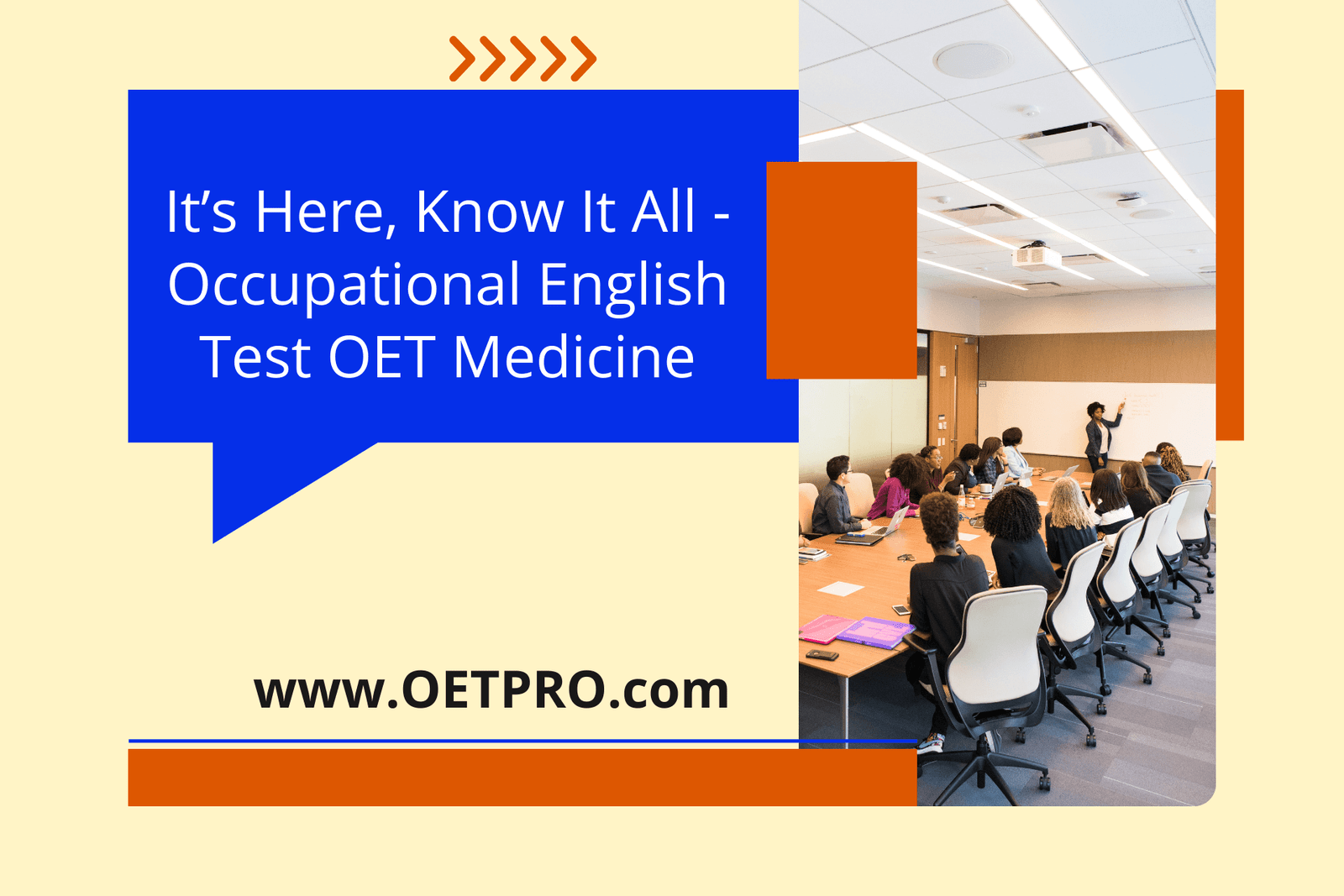
It’s Here, Know It All - Occupational English Test OET Medicine
The field of medicine knows no borders, and effective communication is essential. Healthcare professionals, including doctors and nurses, come from many different backgrounds and often need strong English skills.
This is where the Occupational English Test (OET) Medicine becomes important.
This complete guide explains why OET Medicine matters and offers helpful preparation tips to help you succeed.
What Does the Occupational English Test (OET) Test?
The Occupational English Test (OET) is a globally recognized English language proficiency test designed specifically for healthcare professionals.
It evaluates whether medical professionals can communicate clearly with patients, colleagues, and other healthcare staff.
For professionals who want to work in English-speaking countries, OET is a crucial step. It focuses on real healthcare communication rather than general English.
Why OET Is Important in Medicine
Good communication is critical in healthcare because it directly affects patient safety and quality of care.
The OET Medicine category tests language skills in medical settings, making it especially relevant for doctors, nurses, and other healthcare practitioners.
Regulatory bodies, hospitals, and healthcare organizations across the world trust and recognize OET. It ensures that professionals can communicate confidently and accurately in real-life medical scenarios.
Key Reasons Why OET Medicine Matters
1. Profession-Specific Test
OET Medicine is designed only for healthcare professionals. It assesses medical communication skills that are required in daily clinical practice.
2. Patient Safety
Miscommunication in healthcare can lead to serious errors. OET Medicine focuses on real medical contexts, helping professionals communicate safely and effectively.
3. Global Opportunities
A good OET score opens doors to work in countries like the UK, Australia, New Zealand, Ireland, Dubai, and more.
4. Regulatory Recognition
Many medical councils require OET as proof of English proficiency for licensing or registration.
5. Professional Growth
Preparing for OET helps improve real-life communication skills, leading to better patient interactions and teamwork.
6. Career Advancement
A strong OET score shows commitment to excellence and increases employability in international healthcare systems.
How to Prepare for the OET Medicine Test
Proper preparation is essential for success. A combination of good coaching, regular practice, and reliable study resources can help you achieve your desired score.
Here is a step-by-step guide:
1. Understand the Test Format
The OET Medicine test consists of four sub-tests:
-
Listening – Understanding healthcare conversations.
-
Reading – Interpreting medical texts and documents.
-
Writing – Producing referral, discharge, and transfer letters.
-
Speaking – Role-play scenarios with real-life patient interactions.
2. Assess Your Current Level
Start with a practice test to identify your strengths and weaknesses. This helps you plan your preparation better.
3. Enrol in OET Preparation Courses
Joining a reliable OET course can provide expert guidance, structured lessons, and targeted practice tasks specific to the Medicine category.
4. Use Official OET Materials
Official OET practice tests mirror the real exam format.
You can also begin free online practice at www.oetpro.com.
5. Create a Study Schedule
Plan dedicated time for each sub-test. Consistency is the key to improvement.
6. Practice Regularly
Practice listening, reading healthcare articles, writing case notes, and speaking role-plays. Regular practice builds confidence and fluency.
7. Build Medical Vocabulary
Understanding clinical terminology helps you perform better in all sections of OET Medicine.
8. Improve Time Management
Each part of the test is timed. Practise completing tasks within the given time limit.
9. Get Feedback
Ask a mentor or tutor to evaluate your writing and speaking. Constructive feedback improves accuracy.
10. Simulate Test Conditions
As your exam date approaches, take full-length mock tests under timed conditions.
11. Manage Test Anxiety
Use relaxation techniques to stay calm. A focused mind helps you perform better.
Format of the OET Medicine Test
The OET Medicine test includes:
Listening – Healthcare-related audio recordings followed by questions.
Reading – Medical texts such as guidelines, research extracts, and hospital documents.
Writing – A letter based on case notes (referral, discharge, or transfer).
Speaking – Role-play with patient scenarios.
Understanding this structure helps you prepare effectively.
Practice Questions and Study Materials
To score well, you need consistent practice with OET-style questions.
Try free OET sample tests and practice materials designed for healthcare professionals.
OET Medicine vs. Other English Tests (IELTS, TOEFL)
1. Healthcare-Specific Content
OET Medicine focuses solely on healthcare scenarios, unlike IELTS and TOEFL, which are general English tests.
2. Profession-Specific Vocabulary
OET evaluates medical terminology, making it more relevant for clinical practice.
3. Realistic Situations
OET tasks mimic real patient interactions, case notes, and workplace communication.
4. Regulatory Acceptance
Most medical councils prefer OET over other tests.
5. Better Preparation for Real Life
OET improves everyday communication in hospitals and clinics, helping healthcare workers feel confident and prepared.
Final Thoughts
OET Medicine is more than just a language test—it is a vital tool for healthcare professionals working towards international careers.
By improving communication skills, OET not only helps individuals succeed but also contributes to better patient care and safety.
Mastering OET Medicine enables healthcare professionals to connect with patients from diverse backgrounds and deliver compassionate, clear, and effective care.
Frequently Asked Questions
Q1. Is the OET Medicine test recognized internationally?
Yes. Healthcare organizations and regulatory bodies worldwide accept the OET Medicine test.
Q2. What score do I need to pass?
Passing requirements vary by country and profession. Check with the regulatory body you’re applying to.
Q3. Can I retake the exam?
Yes. You may take the OET Medicine test as many times as needed.
Q4. Are there specific preparation courses for OET?
Yes. Many institutes and online platforms offer OET-focused training.
Q5. How long is the OET score valid?
OET scores are generally valid for two years.